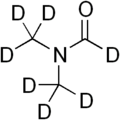 | |||
| |||
| Names | |||
|---|---|---|---|
| IUPAC name | |||
Other names
| |||
| Identifiers | |||
3D model (JSmol) | |||
| Abbreviations | DMF-d7[ citation needed ] | ||
| 1908468 | |||
| ChemSpider | |||
| ECHA InfoCard | 100.022.497 | ||
| EC Number |
| ||
PubChem CID | |||
| UN number | 2265 | ||
CompTox Dashboard (EPA) | |||
| |||
| |||
| Properties | |||
| C 32 H 7NO or C 3D 7NO | |||
| Molar mass | 80.1369 g mol−1 | ||
| Appearance | Colourless liquid | ||
| Density | 1.03 g mL−1 | ||
| Boiling point | 153 °C (307 °F; 426 K) | ||
Refractive index (nD) | 1.428 | ||
| Hazards | |||
| GHS labelling: | |||
  | |||
| Danger | |||
| H312, H319, H332, H360 | |||
| P280, P305+P351+P338, P308+P313 | |||
| Flash point | 58 °C (136 °F; 331 K) | ||
| Explosive limits | 2.2–15.2% | ||
| Lethal dose or concentration (LD, LC): | |||
LD50 (median dose) |
| ||
| Related compounds | |||
Related alkanamides | |||
Related compounds | |||
Except where otherwise noted, data are given for materials in their standard state (at 25 °C [77 °F], 100 kPa). | |||
Deuterated dimethylformamide ((CD3)2NCOD), also known as deuterated DMF, is an isotopologue of DMF ((CH3)2NCOH) in which the hydrogen atom ("H") is replaced with a deuterium isotope ("D"). Deuterated DMF is a relatively uncommon solvent used in NMR spectroscopy. [1] [2]

